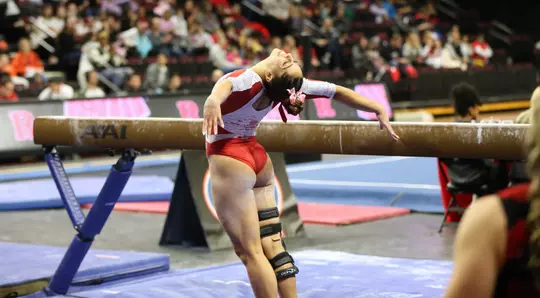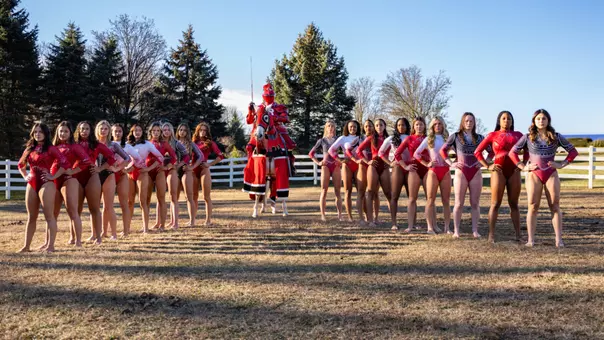
In R Words: Gianna Ortiz On Student-Athlete Mental Health
Sep 21 | Women's Gymnastics
By Gianna Ortiz
Conversations about mental health are important.
Like this one…
“I can’t take it anymore. I need help.”
“It's not going to do anything.”
“I have to try, I feel like something is wrong with me.”
“There is something wrong. You don’t know how to handle it. That’s why you’re in this situation. Getting help isn’t going to do anything but make you look weak, you have to deal with this on your own.”
“Maybe you’re right. But I have to try. All I do is sit in my room and cry. Mom and Dad are worried and they have every reason to be.”
“You can’t let anyone else in. Just face it, you’ll never be who you used to be.”

This may read like a disagreement between two people, but it is actually a conversation within myself. My freshman year in college gymnastics, before I came to Rutgers, I went through a number of traumatic things - racism and bullying were just the beginning. Before preseason I was told that I would never compete in beam in college. Because of this, I was too scared to speak up to my head coach so I would just tell my parents. When it continued to happen my dad called the head coach and had a conversation with him. Nothing was done about it and I continued to suffer, just trying to do gymnastics and keep my head down. Not too long after, I was sent home from an intrasquad and told not to come back to practice because I wasn’t friends with the girls on the team outside of the gym. I was told I could come back the following Monday only if I forgave everyone, forgot everything that happened and came back starting with a clean slate. I tried, but not much changed. I realized it wasn’t the right place for me, so I left. I had a conversation with my head coach, entered myself in the transfer portal, packed up my stuff, and my dad picked me up and took me back to Florida. I thought leaving would be the end of it, but I was wrong.
These thoughts were always in my head even after I left. The whole experience made me question myself, my confidence, and my gymnastics. I didn’t even know who I was anymore.
Looking back at my career in club gymnastics I miss who I used to be. A bright, happy person who lit up every room she walked in. A girl who saw the good in everyone and everything. And I'd like to think she is proud of who I am today and how I got here despite the hardships. But what I don’t think a lot of people understand, is how much college sports can change you, not only as an athlete but as a person. At the end of the day we’re human too. People get caught up in the glory of student athletes and they want their team to win but do they care about the athlete themselves?
A big difference I have noticed coming to Rutgers is that they prioritize mental health here. Our team has something called the fifth event. This is where small groups of us meet with a sports psychologist and we talk about how practice has been, how it's been affecting us mentally, how school might be impacting us, and we learn tools to help us work through any issues. For a while I only utilized this resource and thought it was helpful, but not enough to pursue anything on my own.
I actually pushed my mental health to the side for a long time. It was too hard to talk about and the thought of opening up to anyone again scared me. So for a while I had a difficult time. Everything was a trigger for me and I honestly was drowning in my feelings but still getting through workouts and meetings, wondering if this was all worth it.

Then I got injured.
I ruptured my ACL on the third meet, ending my season. I was devastated, and even more upset that it wasn’t something I could’ve had control over. When I was injured is when I realized how alone I was, and so easily replaced. At that point nothing else mattered.
I got surgery, stayed at school all summer, and put all my focus and energy into recovering. But I still felt empty. I figured once I got back I’d feel better again because that's who I’ve always been: a gymnast. I came back and had a good season but it still wasn’t good enough for me. Yeah, I felt a little more like myself but I was still hurting on the inside. That’s when I realized that I never fully healed, from anything. I bottled it up and kept pushing because that’s what athletes are supposed to do right?
“It’s time to try.”
"We’ve tried. It doesn’t work.”
“It didn’t work because we were trying to go back to the person we used to be.”
“But I wish I was still her.”
“We have to let go, we have to heal. We’re never gonna be her again. But we can be better, we can be truly happy again.”
“You’re right, let's try again.”
So I am trying again.
If you think you need help, don’t be afraid to start by asking. The Rutgers Athletics Behavioral Health team is very beneficial for student-athletes. They educate, support, and help them navigate the life of being a Division I student-athlete inside and outside of sport. The process is very easy and less intimidating than some may think. The office is in the Athletic Performance Center in the sports medicine office. You can call or go in the office and ask to set up an appointment. Then Dr. Gabby, one of the sport psychologists, will reach out for a consultation. The point of this is to gather information in order to best determine which member of the staff can help you with what you are going through, depending on our culture, our family of origin, and our unique experiences.
Not many people understand the things that student-athletes deal with and it is nothing to be afraid or ashamed of. I am grateful for the support around me to make those internal dialogues a little less one-sided.














